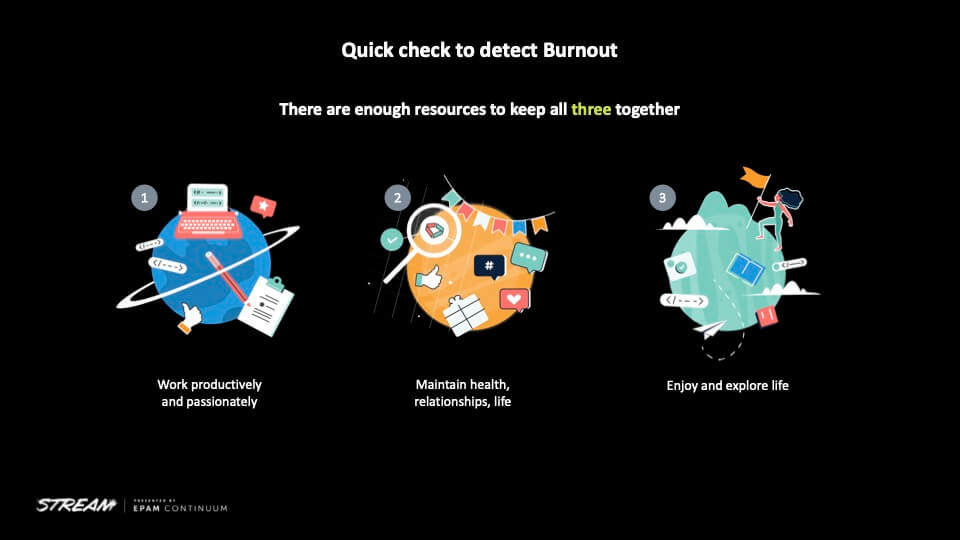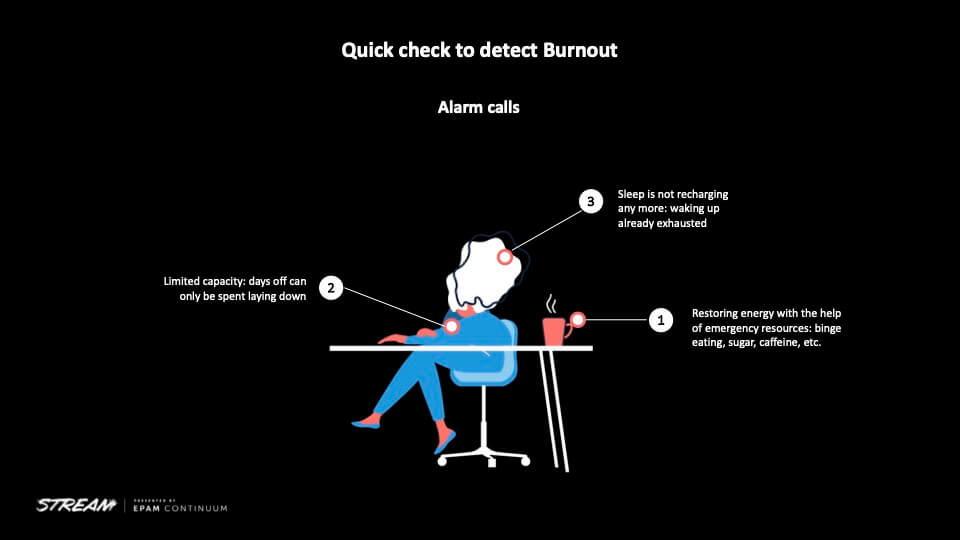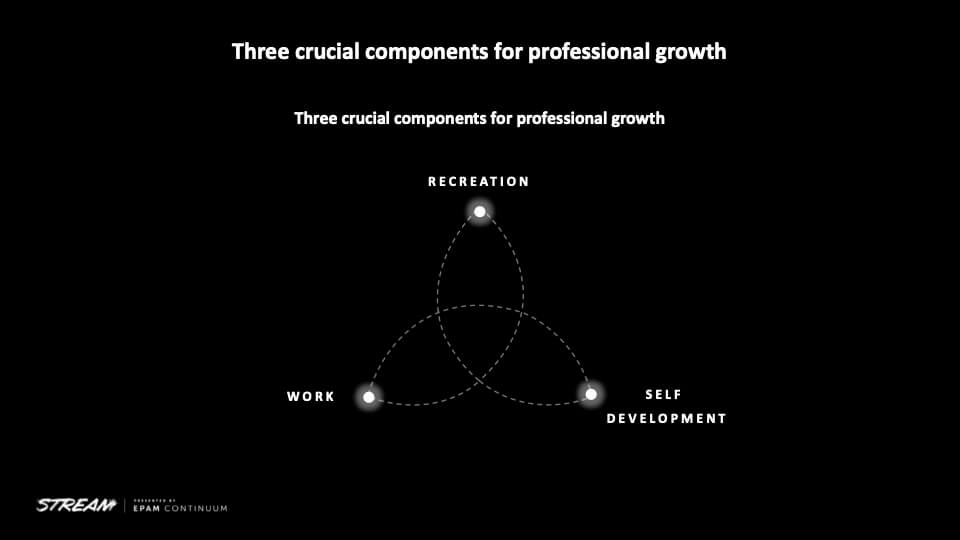Why we burn out and how to deal with it
What are the phases of burnout, what factors lead to it, and most importantly — how can you identify and cope with it quickly?
.jpg)
Aleksey Didik, Director, Technology Consulting at EPAM, gave a presentation on burnout in IT at EPAM’s annual internal Stream Conference, which is held for both employees and clients. Anywhere Club is offering the content of Aleksey’s presentation and making the video* available to registered members of the club.
_(1).png)
— The topics of professional burnout, physical health, and psychological safety in IT are very relevant now and are an important part of my work. So, I want to share my observations and offer some tips on how to deal with professional burnout in the modern world.
What is emotional burnout
— The human psyche has a finite capacity for stressors. People can’t endlessly work, manage various stressful factors, and receive and process information from the outside world. At any given moment, you may be overwhelmed by an excessive amount of information, and then you need time to process it, and this causes stress.
How does it work
— When a person experiences excessive stress, it causes an adrenaline rush and the activation of various mental functions. You respond by focusing on solving the problem, on coping with it. But after that, you need some time to rest, recuperate, and relax. This is a normal cycle: you experience stress, then relief, and then you need rest. From a medical point of view, there is nothing inherently wrong with stress. As a person interacts with the world daily, they encounter different stressors and varying degrees of stress. The main thing is that, when coping with stress, you take time to rest. If you do not rest enough, the amount of stress you are experiencing will accumulate and increase, at which point professional burnout will not be far behind. Of course, you won't burn out in a single moment. Generally, it proceeds in several stages.
Burnout phases
— Let's examine the phases of burnout and how they proceed:
- You begin to feel a certain hesitation, frustration at work. You do not want to work on something new. You try to delegate more because you don't want to accept responsibility. Relationships with colleagues deteriorate. You are constantly irritated, negative emotions prevail over positive ones. This is the first stage of professional burnout, and all of these factors can be indicators that it has begun.
- If you have already moved on to the second phase of burnout, you start avoiding people, rest does not bring relief, you do not feel restored, interest in work decreases, and conflicts become the norm. During this phase, your body tries to protect itself and symptoms such as frequent headaches, colds, and other physical ailments begin to manifest.
- The third phase occurs if you continue to be under stress and are not able to find ways to reduce it. Interest in work and other activities is lost, replaced by apathy. Your body can be susceptible to, or show signs of, very serious diseases. Unfortunately, the problems of the third phase are not so easy to solve. So be careful. If you are already in this phase and have these symptoms, then you should seek medical advice.
How to identify burnout quickly

As in the triangle of project management, it is very difficult to do three things at the same time. In that scenario, you need to be within budget, and do everything efficiently and on time. Similarly, in real life, you need to balance three things simultaneously to avoid burnout:
- Work productively and passionately;
- Maintain health and relationships;
- Enjoy and explore life.
If a balance among these things is present in your life, that's optimal. But if one of the components is missing or minimal, it can lead to burnout.

In addition to the indications of burnout mentioned above, there are some specific "red flags" of approaching burnout:
- You don't have any strength; on weekends, you just want to lie down, active recreation does not seem appealing or even possible;
- Sleep no longer helps restore your strength, even walking is exhausting; and
- You constantly feel the need to restore your energy with sweets, lots of caffeine, etc. In the future, this may lead to “self-medicating” with the excessive use of alcohol or drugs.
Factors leading to burnout
— Let's consider what needs to be monitored during work — and in life generally — to avoid burnout:
- The first group of factors is called comfort factors. It is related specifically to your personal comfort. Everyone is different, but the goal is to do what is necessary to be comfortable with yourself, with your workplace, with the people around you, etc. You should work in a rhythm that is comfortable for you, in a comfortable team, in an office and on tasks that are interesting to you.
- Role/Identity factors. There should be a correspondence between the expectations of you based on your role in the team and the expectations that you have regarding your work. Some of the biggest stress you will experience arises when you are not able to be yourself. If someone expects you to write code, and you are a Product Manager, then this does not make sense. If you are expected to manage a team, and you don't want to manage people, the disconnect — the lack of correspondence between your skills and abilities and the expectations — can be very stressful.
- Emotional factors. These factors refer to how ready you are to interact with the world, to express yourself. How do you feel when you are communicating with other people? The focus here is all about your emotional health and safety.
- External factors. These are any factors that are unrelated to work that affect your emotional state, your health and safety. For example, there is a war going on in the world right now, and we all constantly read the news about it and are under stress as a result.
How to deal with burnout
— How do you deal with burnout? The first thing to do is to start paying attention to yourself, your feelings, and your reactions. Do you know what causes you more stress or less stress? Have you had enough rest or not? What are you angry about and what does not trouble you? Are you sad or not? Are you happy or unhappy? All of these questions, which may seem obvious, are very important and worth exploring. You need to know what emotions you are experiencing, what resources you have, and what your body feels. In the modern world, special gadgets and healthcare applications can help you answer some of these questions. I use a smartwatch myself, which helps me keep track of how much sleep I've had, whether I am rested, what my blood pressure is, etc. This helps to objectively track your condition and to understand how you feel and when you need rest.
How does stress impact you?
— People react differently to stress. Generally speaking, there are three types of response:
- Fighting;
- Running; and
- Freezing.
Each person experiences stress in different ways, and rests effectively in different ways.
For those who respond to stress by fighting, dynamic and active types of recreation, such as hockey, horseback riding, and computer games, are suitable.
For those who tend to flee, active sports are suitable: swimming, running, active walks, and more.
And for those who tend to freeze, activities such as drawing, completing puzzles, engaging in other craft activities, or decorating the house, might be most effective.
— Watch yourself, study yourself. Your attention and observations will help you cope with stress and professional burnout. Do not hesitate to admit that running does not work for you, and that completing puzzles is more appealing. Don't let yourself be swayed by generally accepted social rules and norms. If everyone is running, it doesn't mean that running is good for you. It may technically be good for your physical health, but it may not be the best way for you to relieve stress. Taking care of your health and successfully managing stress are related, but not the same thing.

And now a few words about the three main components of professional growth and balanced development in all areas of your life. These three components are:
- A job that you like;
- Rest — a sufficient amount of it; and
- Self-development.
Study yourself — this is the first and most important thing to do. Then, you can identify like-minded people in your team, discuss things you care about, and find ways to avoid different kinds of stress that you encounter during your day. And, of course, you need to talk to your manager. After all, they are interested in you being productive, achieving results, and not burning out.
— Your well-being is your responsibility. It is important to know yourself. Be curious about the world and, first, about yourself. Join the culture of leisure. I hope that you never burn out and that, if you feel yourself going down that road, you will be able to quickly take the necessary steps to turn things around.
Watch the entire video (available only for registered Anywhere Club users):
The content of Alexey's talk was prepared under the guidance of Lizaveta Shmarava, a practicing psychologist.